It’s appropriate that the so many of the nineteenth century’s great thinkers in the UK were such passionate political sociologists. After all, Karl Marx it was who pointed out that capitalism was the necessary precursor for socialism. And now was the time when capitalism took off – creating an urban society that was vibrant, more educated and increasingly aware of the heirarchies based on unequal wealth and power. An expanded and educated middle class in an urban society had the all elements for observation, thinking and analysis…and often at least some leisure to do it in.
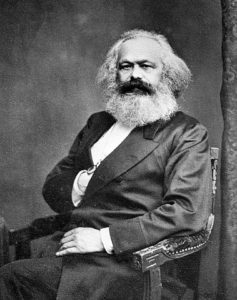 Marx himself, of course, was absolutely the most influential thinker of the last two centuries. It’s because of his approach that we have well-accepted notions of democracy, public health, education, housing, gender equality – all of these notions arise from ideas of fairness and how a society might encourage or discourage it. These ideas are now part and parcel of life, no matter how well or piecemeal they are enfolded into where we live, to the point where most of us don’t question their existence as, at least in some way, a foundation of civilised society. We may not see ourselves as socialists, but Marx and the Victorian political sociologists have had their influence.
Marx himself, of course, was absolutely the most influential thinker of the last two centuries. It’s because of his approach that we have well-accepted notions of democracy, public health, education, housing, gender equality – all of these notions arise from ideas of fairness and how a society might encourage or discourage it. These ideas are now part and parcel of life, no matter how well or piecemeal they are enfolded into where we live, to the point where most of us don’t question their existence as, at least in some way, a foundation of civilised society. We may not see ourselves as socialists, but Marx and the Victorian political sociologists have had their influence.
Not everyone accepts these notions as self-evident, of course. The Far Right still doesn’t, and the inheritors of the US Tea Party are quite forthright in their condemnation of equal access to health, for example, as socialist. From McCarthyites down to the current batch of Far-Righters, there’s been a problem with anything that claims an as-of-right equality of access. The rest of us are normal and not so threatened by poor people living, breathing and having a path out of poverty.
Anyway, this blog isn’t about the descendants of the Tea Party. Nor, actually, is it about Marx. After all, you’ve heard of him, and while he led the way, he wasn’t the only great thinker of the time.
Things had begun to change, of course, before the nineteenth century. And change often brings about discussion – what’s going on, why, and is it right, for example. Regimes were very shaken by France’s revolution and overthrow of its monarchy, and still a bit nervous even with the reinstatement of royalty in France. Then of course, the smelling salts had to come out again in 1848 when France had another revolution and just about everybody else did too.
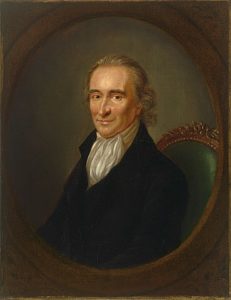 When you overthrow hierarchies, it tends to become part of conversation. In 1791, Thomas Paine’s Rights of Man was a defence of the French revolution (and also of radical change in America, where he had immigrated), and said that popular political revolution was justified when governments don’t safeguard the natural rights of its people.
When you overthrow hierarchies, it tends to become part of conversation. In 1791, Thomas Paine’s Rights of Man was a defence of the French revolution (and also of radical change in America, where he had immigrated), and said that popular political revolution was justified when governments don’t safeguard the natural rights of its people. 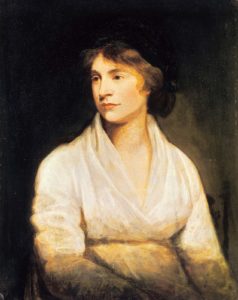 Pretty soon, one of the earliest works of feminist philosophy, A Vindication of the Rights of Woman: with Strictures on Political and Moral Subjects, by multiple author Mary Wollestonecraft, had hit the streets. Actually, while the title might very well be in response to Paine’s work, in fact she had been particularly nettled by a report to the French National Assembly in 1791, in which Charles Maurice de Talleyrand-Périgord said that women should only be taught domesticity.
Pretty soon, one of the earliest works of feminist philosophy, A Vindication of the Rights of Woman: with Strictures on Political and Moral Subjects, by multiple author Mary Wollestonecraft, had hit the streets. Actually, while the title might very well be in response to Paine’s work, in fact she had been particularly nettled by a report to the French National Assembly in 1791, in which Charles Maurice de Talleyrand-Périgord said that women should only be taught domesticity.
It was a beginning, but written in a hurry. Actually, it was quite well received at first, and it might have been interesting to history had poor Mary not died before her follow-up could be produced. Unfortunately, her widower blew both Mary and her reputation out of the water by revealing all about her unorthodox lifestyle, after her death following the birth of her second daughter, Mary Shelley (Yes, that Mary Shelley).
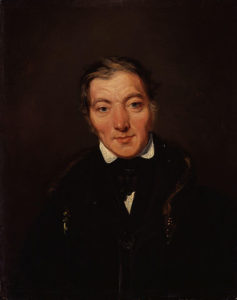 Change, as I said, makes people think. What with the French revolution, children coughing up the coal in the mines where they worked, and the ‘dark, satanic mills’ (real ones, not the wind towers dubbed ‘dark, satanic mills’ by Australia’s ex PM Tony Abbot, I kid you not) blackening the sky with their smoke in industrial townships, the Welsh industrialist Robert Owen was overcome by the conditions of those who worked in factories. He stopped employing children under 10, lobbied Parliament about child labour, established the cooperative movement, and attempted to create a utopian community at New Lanark (see the opening pic).
Change, as I said, makes people think. What with the French revolution, children coughing up the coal in the mines where they worked, and the ‘dark, satanic mills’ (real ones, not the wind towers dubbed ‘dark, satanic mills’ by Australia’s ex PM Tony Abbot, I kid you not) blackening the sky with their smoke in industrial townships, the Welsh industrialist Robert Owen was overcome by the conditions of those who worked in factories. He stopped employing children under 10, lobbied Parliament about child labour, established the cooperative movement, and attempted to create a utopian community at New Lanark (see the opening pic).
Robert Owen even set up the Grand National Consolidated Trades Union but (to cut a long story short) this was short-lived, along with other protests and movements cut down by the authorities in the 19th century. Eventually, some did manage to prosper, perhaps by being better organised and less radical. 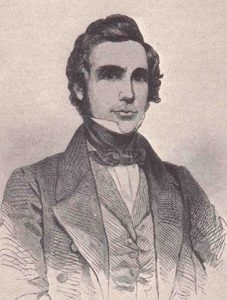 In the meantime, the Chartists rose up, whose aims were specifically political. They wanted the vote for workers. I have always been enamoured of William Lovett, initiator of the Chartists, and once wrote enthusiastically about 10,000 words on him in what was supposed to be a short tutorial paper at University. My crush was, sadly, a little ameliorated by the fact, once again, that Chartists told female would-be suffragists that they should tone down for now and they wouldn’t help the cause by also insisting on the vote. ‘Later,’ they were told.
In the meantime, the Chartists rose up, whose aims were specifically political. They wanted the vote for workers. I have always been enamoured of William Lovett, initiator of the Chartists, and once wrote enthusiastically about 10,000 words on him in what was supposed to be a short tutorial paper at University. My crush was, sadly, a little ameliorated by the fact, once again, that Chartists told female would-be suffragists that they should tone down for now and they wouldn’t help the cause by also insisting on the vote. ‘Later,’ they were told.
There were demonstrations, attempted uprisings, strikes and a lot of unrest. Queen Victoria, apparently, felt quite threatened. There was an enormous petition in 1842 of over three million signatures. It was rejected, and the Northern Star newspaper commented:
‘The mark and brand of inferiority is not to be removed. The assumption of inferiority is still to be maintained. The people are not to be free.’
By then, more than one hundred Chartists had already been transported to Australia (1839-40).
At the other end of the social scale, John Stuart Mill had been brought up on a diet of Greeks, arithmetic, physics, astronomy and history. Proving that teenagers can be very impressive, he spent a year in France with the Benthams (you’ll have to look up Jeremy Bentham. I haven’t got the space here), and whiled away some time doing higher mathematics and sitting in at winter courses in chemistry, zoology and logic in Montpellier. Not surprisingly, he grew up to be quite clever and respected, but, more to the point for this blog, he was a proto-socialist of sorts. A philosopher, an economist, a logician and an ethical theorist, he was a utilitarian, which means (roughly) that he believed the only effects of actions that are relevant are the good and bad results that they produce. 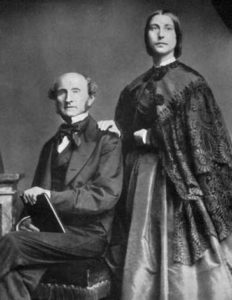 What Mill would regard as ‘good and bad’ is evident in his body of work, which dwelt on freedom of speech, logic and political economy. A desire for a moral society underpinned his work, and we are deeply impressed with his view that women’s inferior position was an imposed one. He wrote his essay on the ‘Enfranchisement of Women’ either with or inspired by his wife Harriet.
What Mill would regard as ‘good and bad’ is evident in his body of work, which dwelt on freedom of speech, logic and political economy. A desire for a moral society underpinned his work, and we are deeply impressed with his view that women’s inferior position was an imposed one. He wrote his essay on the ‘Enfranchisement of Women’ either with or inspired by his wife Harriet.
Harriet was married to a John Taylor when she met JS. They fell in love, and thereafter for some time she suffered horribly with guilt (some say) about the ethics of their relationship. Relations between them were all very sporadic for a while, as a result, but she did separate from John to live in her own house until his death. She and JS married two years after John Taylor died. She and John Stuart Mill co-authored a number of pieces on domestic violence, about which she had already written much, and is generally known as a philosopher and women’s rights advocate.
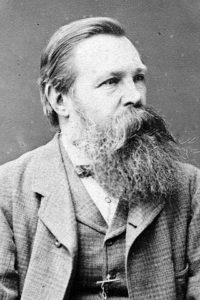 Friedrich Engels was another who, like Robert Owen, was not keen on the abuse of the poor by his class. His Prussian industrialist father, annoyed at the righteous carping by his boy, sent him off to calm down and learn the ropes of the family business in Manchester. Instead, of course, Engels met up with Karl Marx, turning his acute eye to meticulous observation of social conditions of the time, and produced his The Condition of the Working Class in England. He was then 24, and his research methods – based on his own observations and the formal reports of others including those to the government itself – were well-enough founded as to make him a reliable source on living conditions among the poor in Manchester in 1844. Do I need to say these conditions were pretty appalling?
Friedrich Engels was another who, like Robert Owen, was not keen on the abuse of the poor by his class. His Prussian industrialist father, annoyed at the righteous carping by his boy, sent him off to calm down and learn the ropes of the family business in Manchester. Instead, of course, Engels met up with Karl Marx, turning his acute eye to meticulous observation of social conditions of the time, and produced his The Condition of the Working Class in England. He was then 24, and his research methods – based on his own observations and the formal reports of others including those to the government itself – were well-enough founded as to make him a reliable source on living conditions among the poor in Manchester in 1844. Do I need to say these conditions were pretty appalling?
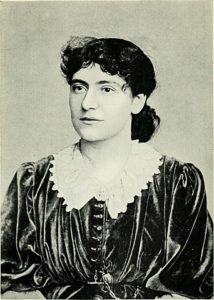 Marx had an impressive daughter amongst his offspring. Eleanor, known as ‘Tussy’, was born Jenny Julia Eleanor Marx in 1855, and absorbed her father’s analytical and socialist approach at his knee, of course. Engels was like a second father to her. She was highly educated and bilingual, and worked on translating and editing many of her father’s works. But it looks as though she was so intent on not taking centre stage that she handed over much of the credit for her own written work to her long-time lover, Edward Aveling. No-one liked him – George Bernard Shaw wrote, says Eleanor’s biographer Rachel Holmes, that he had ‘the face and eyes of a lizard, and a voice like a euphonium.’ His secret marriage to a much younger woman shattered Eleanor, and she committed suicide at 43. She should be remembered as a highly intelligent woman who was prominent in the politics of the time, was a fenian at 13 (such impressive teenagers!), and founder of the Socialist League. She was very active in support of women workers and, not surprisingly, vocal as a feminist. I’d have chosen the Marx family group pic, with Engels, but couldn’t find it anywhere for free or even cheap. There’s an irony there.
Marx had an impressive daughter amongst his offspring. Eleanor, known as ‘Tussy’, was born Jenny Julia Eleanor Marx in 1855, and absorbed her father’s analytical and socialist approach at his knee, of course. Engels was like a second father to her. She was highly educated and bilingual, and worked on translating and editing many of her father’s works. But it looks as though she was so intent on not taking centre stage that she handed over much of the credit for her own written work to her long-time lover, Edward Aveling. No-one liked him – George Bernard Shaw wrote, says Eleanor’s biographer Rachel Holmes, that he had ‘the face and eyes of a lizard, and a voice like a euphonium.’ His secret marriage to a much younger woman shattered Eleanor, and she committed suicide at 43. She should be remembered as a highly intelligent woman who was prominent in the politics of the time, was a fenian at 13 (such impressive teenagers!), and founder of the Socialist League. She was very active in support of women workers and, not surprisingly, vocal as a feminist. I’d have chosen the Marx family group pic, with Engels, but couldn’t find it anywhere for free or even cheap. There’s an irony there.
Eleanor, obviously, belonged to a time when the threads were coming together to form a cogent piece – the political philosophy of socialism itself. Albeit, it must be said, with factions and fractions and argumentation about which way to go and what would be a betrayal of the etc etc. This tendency to fragment should be familiar to many even now, of course. We all heave a sigh.
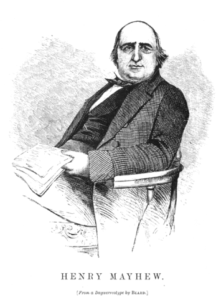 Society was going through its upheavals, as we know. And nowhere was this more in evidence than in cities. Henry Mayhew was a journalist known for his recording of daily life in London mostly post-1850.
Society was going through its upheavals, as we know. And nowhere was this more in evidence than in cities. Henry Mayhew was a journalist known for his recording of daily life in London mostly post-1850. 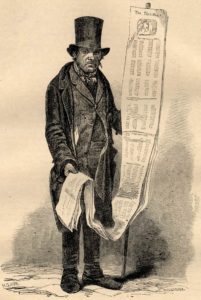 He was methodical and organised, and is now a major source for anyone who wants to know about the social history of the time, the effects and spread of cholera, the lives of those working for their living in those streets. (the man to the right is selling ‘long songs’). Mayhew probably didn’t regard himself as a socialist, but I do mention him here since social investigation is fundamental to the development of socialist philosophy – and also because he is an example of what Victorian times produced. An observer of his own social environment.
He was methodical and organised, and is now a major source for anyone who wants to know about the social history of the time, the effects and spread of cholera, the lives of those working for their living in those streets. (the man to the right is selling ‘long songs’). Mayhew probably didn’t regard himself as a socialist, but I do mention him here since social investigation is fundamental to the development of socialist philosophy – and also because he is an example of what Victorian times produced. An observer of his own social environment.
I’ll just throw in here a mention of a scene in What Empty Things Are These where Adelaide the child, and her family, become lost in the backstreets of London. Those pressing themselves against the windows of their carriage are those who were rendered homeless after the slums that Mayhew had identified had been cleaned away. Ah, the irony.
In another episode, I’ve mentioned feminists who laboured specifically on women’s rights and their access to higher education and employment.
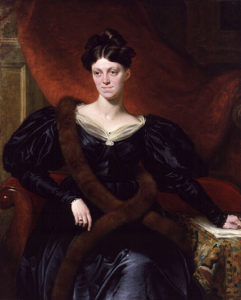 To add to the list of women history has chosen to shrug away, there’s also Harriet Martineau. Her first work in 1832 was a series of stories entitled Illustrations of Political Economy. It was an educative piece. Via her translations of Comte’s writing from French to English, she introduced sociology to English-speaking scholars. Her most famous sociological works were Society in America (1837), and Retrospect of Western Travel (1838), and she pointed out in general that capitalism gave the lie to claims of moral principle embedded in the political system of the US; she pointed out the repressive aspects of so-called Free Enterprise; and pointed out that equality was meaningless without women’s rights.
To add to the list of women history has chosen to shrug away, there’s also Harriet Martineau. Her first work in 1832 was a series of stories entitled Illustrations of Political Economy. It was an educative piece. Via her translations of Comte’s writing from French to English, she introduced sociology to English-speaking scholars. Her most famous sociological works were Society in America (1837), and Retrospect of Western Travel (1838), and she pointed out in general that capitalism gave the lie to claims of moral principle embedded in the political system of the US; she pointed out the repressive aspects of so-called Free Enterprise; and pointed out that equality was meaningless without women’s rights.
We should not be surprised that she was largely ignored by the blokes in academic sociology.
I’ll stop there. There are plenty more socialists to be discovered via determined surfing, but these are just some that have needed some mentioning. Especially the feminists, male and female. You might wonder why Harriet Taylor Mills and Eleanor Marx came with descriptions of their domestic troubles… to be plain, in the 19th Century even more than now, women were tied to the domestic practically and emotionally, and also of course to notions of self in relation to their male associations. Sad but true. It’s not an easy thing to avoid, when you live in a society that only looks at women in relation to men. Think of George Eliot, and why she chose a male name.
